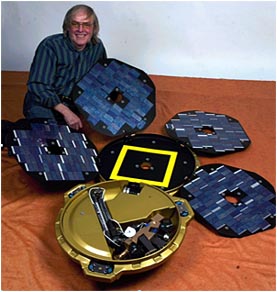A public organization called spending watchdog is attacking the scientists responsible for the Beagle 2 spacecraft that was lost on Mars for ignoring the relatively high risk of mission failure when they applied for British government funding

The British government allocated an amount of about 40 million dollars for the British-made lander, which has not been heard from since it separated from its mother spacecraft in mid-December.
Beagle-2 was Europe's first attempt to land a spacecraft on Mars - designed to search for signs of life on the neighboring planet. The tiny lander was supposed to spend six months exploring and analyzing rock and soil samples using a robotic arm, and send the data back to Earth via the European Mars Express spacecraft orbiting Mars.
Mission controllers believe that the lander almost certainly crashed on Mars on Christmas Day, almost certainly because the atmosphere was less compressed than expected. The report by the British Accountant General's Office found that the potential for the airbags to fail upon impact was identified at the beginning of the project and work was done to reduce the risk. However, when the partnership centered on the British National Space Center submitted the funding request, it emphasized the potential benefits of the project and less the risk of failure, the Accountant General's Office said. In written documents, the center magnified the chances of the success of the mission along with the costs and benefits. given in the report.
The risk, and the steps taken to mitigate the risks, should have been detailed in the official application document, he added. The accountant general also said that Beagle-2 costs have grown from about 49 million dollars, when the researchers submitted the first request for funding in 1997, to 80 million dollars in practice.
The Accountant General's Office praised the mission as contributing to UK space exploration through advanced technologies in the field of instrument miniaturization and robotics.
The partnership needed to identify how it intended to benefit from the EU's increased activity in space, minimize project risk through early implementation and better measurement of the benefits that space investment brings to the UK, said Accountant General Sir John Bourne.
Prof. Colin Pilliger, the lead scientist on the project is now seeking additional funding and support for a new spacecraft. He wants another mission to send more than one rover to Mars in early 2007.
